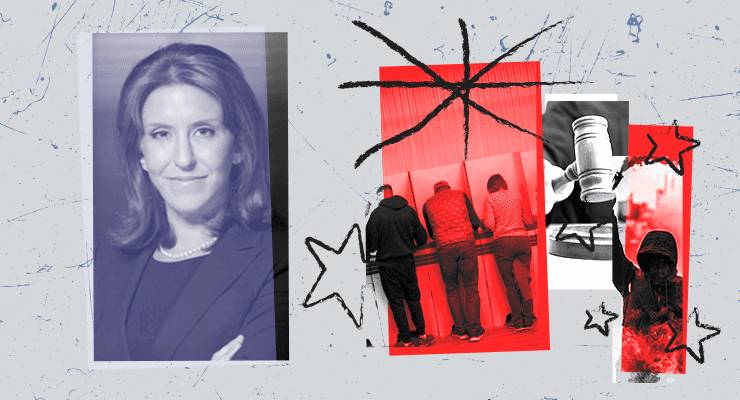
This is part 14 in a series. For the full series, go here.
A few months ago on Twitter, a gay Asian man defended a social media pile-on by an Indigenous bloke of a white feminist.
“It’s gone too far,” I heard myself say, incredulous at my own words even as they poured from my mouth. “Political correctness gone mad.”
This is where I find myself as the end of 2021, as the second year of the global pandemic grinds to a close and the democracy in the country of my birth teeters on the brink: sounding like one of the grumpy old men who used to run every Australian newspaper, corporation and government back when I was a feisty young columnist beating the drum for a feminist revolution that couldn’t come fast enough.
So what’s different? Not my personal politics, which remain consistent with the socialist left agenda of supporting multiracial democracy, giving people union jobs and doing what it takes to avert a climate crisis. Instead the impulse to brake comes from my fear that if we don’t slow down and allow the laggards to catch up — and the resistant to reconcile themselves to the world we’ve created — our liberal democracy could fail.
The argument goes like this: democracy is fragile and mobs are a constant threat, driven by emotion rather than reason, fear instead of hope, the will to power rather than to cooperate. Liberal democratic leaders must ensure such citizens are stuffed full of bread and amused by circuses. Why? Because if they fail a demagogue like Donald Trump will arouse them and, like the rats enthralled by the Pied Piper, lead them down the road to authoritarian hell.
Few dispute that in recent times the mob has become restive. What aroused them, however, remains a hot topic of debate. Persistent and racially described economic inequality and institutional violence? Shortcomings of the mainstream media or the Murdoch press? The internet kleptocracy or social media echo chamber? The demise of the gatekeeper function once played by institutionally robust political parties? The injustice of minority rule?
Whatever the cause/s the result is hyperpolarisation, when one part of the electorate views the other as liars and cheats and — consequently — no longer sees its vision for the country as legitimate. Indeed, hyperpolarisation may be the core reason for democratic decline because it legitimises all forms of undemocratic abuses of power including electoral cheating and violence to stop the feared and hated other from taking — or keeping — power.
As Trump put it to his followers at the speech that preceded their assault on the US Capitol: “If you don’t fight like hell you won’t have a country any more.”
Of course, it must be said that abuses of government power and violence are disqualifying in a democracy. Where existing laws have been broken by either side, accountability must be sought, and lessons learnt.
But reversing the strong feelings of animosity and distrust that give rise to such extreme antidemocratic behaviour is more difficult. So difficult that it’s far, far better to prevent hyperpolarisation from occurring than to knit two angry camps of mistrustful and resentful citizens together again. Ask both sides of the troubles in Ireland, or opposing camps in post-apartheid Africa.
The funny thing is that although we believe our politics and social values are too different from our crazy uncle or grandpa to live and let live or agree to disagree, the lived experience of everyone you know over 40 and a spate of new research suggests otherwise.
For example, several studies have found that connecting party labels to a policy is what influences support. This includes research which showed that participants were heavily influenced in the support they gave to proposed policy “nudges” not by whether they thought the policy was fair or right, but whether it supported the goals of their political party.
In another study, moral evaluations of an actor were shaped by the alignment of that actor’s political affiliation with their own, not the moral acceptability or heinousness of the act.
What’s really dividing us, in other words, is not our political and value differences, but our pre-existing partisan ones. For Australians, this insight is critical. While the United States has no choice but to focus on repairing the damage done to its vicious partisan divide, we still have a chance to turn back.
So this new year, why not resolve to spend at least two weeks entirely separate from all forms of social media and political coverage and see how it affects your partisan allegiances and the way you feel about those whose politics differ. Or if this seems impossible, dial back the disregard, disrespect and shaming of those who disagree with us on- and offline?
You’ll be doing your relationships and mental health a world of good. And at this moment in Australian history, it’s just what the democracy doctor ordered.








Bloody good article Leslie. I share your frustration at the dehumanising effect of political polarisation. It may come across as elitist, but the problem is created by our education system giving up roo easily on teaching critical independent thinking to those deemed trade candidates and teaching discredited neoliberal bullsh*t to those wanting to learn. What is not taught is the humanist complexity of what a good society may be.
What a refreshing read. I’m keen to hear our commenters responses. I suspect I know what it will be.
Anyone who has ever had even a cursory glance at the art of negotiation knows that at its core it’s about finding ways to give so you can get.
Like wise change management is about giving people time to observe and an adjust.
Digging in and demonizing others is a sure way to fail. Sells a lot of newspapers/subscriptions though.
The first step to reigning in the radical is to reign in the radical .
…The first step to reigning in the [right/left] radical is to reign in the [left/right] radical .
We really don’t have a lot of time for the climate change deniers and the 4wd loving, gun toting crowd to get onside. If we don’t act now then we won’t have a world in which to enjoy democracy.. we’ll be fighting each other for scraps of food and for shelter from the increasingly violent elements (natural that is, not human).
In America those elements may be both.
I’m not convinced democracy is the best form of government , or even viable in a global world. Churchill was wrong. Compare an authoritarian consensus one party meritocracy, with an adversarial hyper-partisan two party democracy. Does individual self-interest above community well-being lead to 800,000 dead in the US, cf 5,000 in China?
Now Biden’s COP26 credentials are blown out of the water by Manchin (yes, by ONE man…), while China’s remain intact.
We are now observers of an actual real-life ‘experiment’ (the US versus China); the results should be clearer in a decade.
On the other hand, migrants and refugees aren’t desperate to be allowed into China.
4 or 5 party democracy with coalitions and a fair voting system are best. Check Scandinavia, ignore the UK and Us.
One party or a dozen would be irrelevant if they were composed of decent people with integrity, honour & principle – Santa may disappoint us again this year.
Hyperpartisanship may not serve the needs of democracy, but it serves the needs of politicians very well, thank you very much.
In the world of commerce, one of the main aims of a retail organisation is to achieve customer ‘lock-in’, where customers are so committed to buying from you, or so dependent on your products, that they do not even consider another retailer. The main motivation for this is that it is much cheaper to keep a customer you already have, rather than go out and find a replacement for one you have lost.
We can see the political equivalent of attempts at customer lock-in in the language chosen by politicians when describing their opposition. This was especially on display in the last US election, when neither Donald Trump nor the Murdoch press could refer to any Democrat as anything less than a Far Left, Antifa, Communist Socialist. The emphasis being on ‘far’: the opposition political party was/is so distant, so alien, that no-one in their right mind could consider, for even a moment, voting for them. Hence, all sensible and decent voters were/are locked in to voting for the Republicans.
Never mind that the reason many Americans don’t bother to vote is because they believe it doesn’t matter who is in power, they will still be screwed, which rather plays against the whole ‘they are a different species to us’ trope.
The truth is, we’ve all been sold a pup. In a democracy, voters NEED viable choices and options. They NEED at least two (and preferably more) candidates to choose from. If they don’t have this, then it isn’t a democracy. The habit that so many seem to have taken up, where they choose and support a political party right or wrong the way others might support a football team, does none of us any favours. We’d get much better value from all of our politicians, no matter what their stripe, if they all knew they had to win our vote anew at every election, by coming up with good policy.